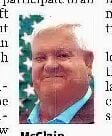
Editor's note: Mid-Valley Media is presenting profiles of candidates in contested races for local seats. In Lebanon, all three wards and the mayor's position are up for election, but only Ward 2 features a competitive race. Dominic Conti will represent Ward 1 following the Nov.
5 General Election, and Jeremy Salvage will return to represent Ward 3. Councilors serve four-year terms. In addition, Mayor Ken Jackola will return for another two-year term, as he is running unopposed.
Ward 2 is in the northwester part of the city that includes much of downtown and the city's medical school. The candidates are presented in alphabetical order. David McClain Candidate for Ward 2 on the Lebanon City Council David McClain declined to participate in an interview to craft this profile, but that doesn't mean he didn't touch base.
He initially answered his phone Sept. 25 to schedule an interview for this profile. Then, on Thursday, Oct.
3, McClain called reporter Alex Powers — about 13 minutes after missing a call — apparently only after confusing the number for that of an employee, also named Alex. "I actually was trying to call an employee," McClain said. He declined to answer questions about his bid for public office, instead offering to email answers copied from a questionnaire requested by another local news media outlet.
Mid-Valley Media journalists produce original content. The publication has no content sharing agreement with Lebanon Local. McClain said he didn't have time — any time, any day — for the 30 to 40 minutes afforded to the other Lebanon candidates.
"I'm generally pretty busy," McClain said. Here's what we know: McClain is a member of the city Planning Commission, the body that often makes decisions about development applications. His term expires June 30, 2028.
McClain aligns himself with conservative causes. In 2022 he made $1,560 in cash contributions to a political organizer representing anti-LGBTQ+ views. Candidate Identification & Support Committee filed with the Oregon Secretary of State under the tagline "to support candidates with conservative values," then ran a slate of city councilors and mayor on an ostensibly Constitutional platform.
The organization got involved locally in part to lobby against the city making an official proclamation that June is Pride month, calling the resolution "based on sexual and lifestyle preferences." The City Council and mayor are nonpartisan positions. The Support Committee was behind Lebanon's eff ort to remove fluoridating compounds from the city's drinking water supply — which will also be on the Nov.
5 ballot —and a disinformation campaign in the run-up to the May 21 primary election, criticizing a failed nearly $11 million bid for new tax revenue for the Lebanon Fire District. Ahead of the primary, rightwing political organizers criticized district leaders and the proposed levy, confusing its purpose with the prior bond. One argument claimed Linn County property owners experience the highest tax rate in the state.
They don't, according to the state. Multnomah, Benton, Washington and Clackamas counties have them beat. Cordero Reid Lebanon grew a lot in a few years, and Cordero Reid wants to address a few essentials for the city's burgeoning population, things like cracked roads, dimly-lit streets — and more diverse politics at the dais.
Reid believes uncontested races stifle political engagement. When everyone on the City Council looks the same or writes similar credentials on their election filings, there's less room at the local government's table for more experiences, he said. "They seemingly don't know how to engage in politics on a level where they can provide their input or challenge people who are already there," Reid said.
"I guess that's fine — if you run businesses and you do a lot of dealings with businesses here in town, that gives you some leverage," Reid said. But "what does the average Lebanite need?" Lebanon voters didn't have a lot of options for their next City Council when he checked, Reid said. Professionally, he coordinates mental health care at the Linn County Department of Health Services in Albany, and worked in Alaska and Seattle.
Races in those areas typically see a lot of competition for votes. "That breeds a good political atmosphere in terms of more people at the table, more minds at the table, a wider berth of experiences," Reid said. Reid's neighborhood in City Council Ward 2 is centered on a park that he described as beautiful.
"But our road is cracked," Reid said. "There are tire marks, and I'm thinking, 'These probably are going to turn into big potholes in the next year or two.' Where is my road service?" That's the mindset of neighbors — young adults, ages 25 to 54, he runs into at convenience stores and fuel stations in city's northwest legislative district that includes much of downtown.
"They're thinking, 'How much does my gas cost? Where do my taxes go? What are my groceries going to cost today?'" Reid said. But those young adults are disconnected from high-level talk about stagnant taxes and budget shortfall. "You're putting a lot of pressure on single-family homeowners to pay for the utilities and infrastructure, especially when we're building out rapidly," Reid said.
The council's eff orts in October to talk with constituents about proposed service fees is a good start, as was the city's adhoc committee on illegal camping — empaneled in 2021 as Lebanon responded to new state laws governing the right to sleep in public. "The council is beholden to the voters in their city. The idea of an ad-hoc committee is a good start, but it needs to be an ongoing conversation," Reid said.
KJ Ullfers KJ Ullfers knows what he doesn't know. He spent years in the U.S.
military and law enforcement organizations. He owned businesses and sat on the city's budget committee. Now, Ullfers is seeking election after serving three years on the Lebanon City Council — elevated to the position by appointment in 2021.
"One of the things I've learned in life is to surround yourself with people who are smarter than you are," Ullfers said. "You have to be sure of yourself and not be afraid to seek guidance from people who know more about these things than you do." Ullfers' tenure coincided with the city's first budgetary deficit in 2023, a shortage of qualified police officers to patrol city streets, and sometimes heated conversations at City Hall about fees proposed to plug holes in Lebanon's general fund.
He was for treating post-traumatic stress disorder with psilocybin-containing mushrooms, but against the Oregon Health Authority's rollout of untested rules policing how cities could allow businesses administering the psychoactive substance. "I don't come in with any ideologies. I don't come in with any agenda.
What that leaves room for is fair decisions for the people of Lebanon," Ullfers said. Ullfers' nonprofit Crossroads Communities houses nearly 200 people across several sites, one-third of whom would have no shelter without the nonprofit. But he opposes Lebanon spending any of its tax revenue on sheltering or addiction and mental health services.
"Bring me a good idea. Let me see it," Ullfers said. "And bring me some funding, because the city isn't going to pay for it.
" Instead, Ullfers' budget priority is the Lebanon Police Department. Get local news delivered to your inbox!.










